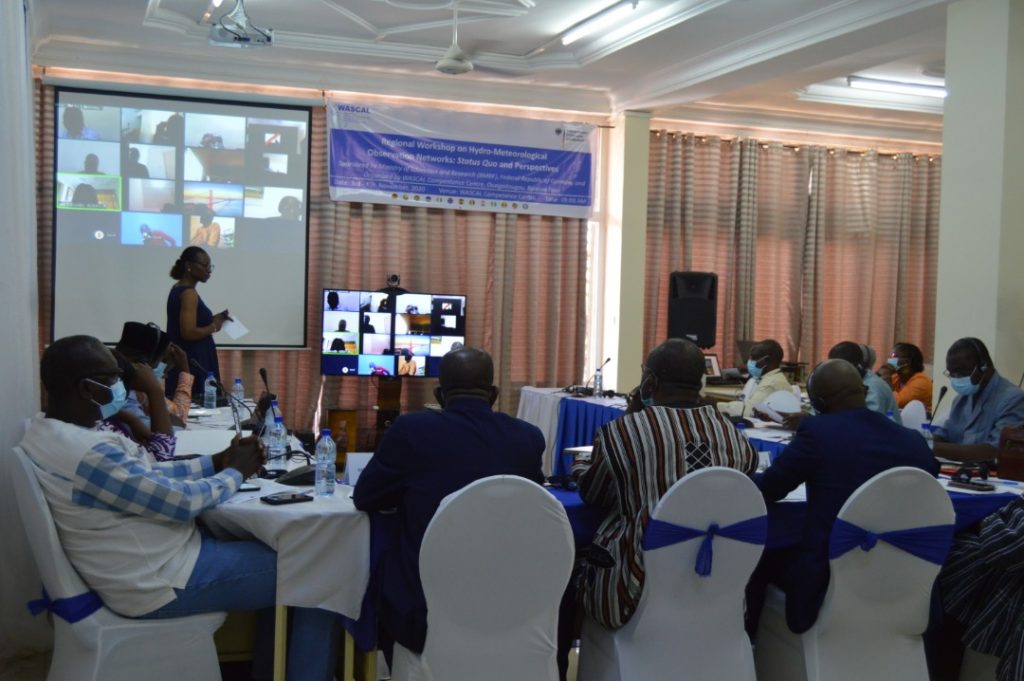The WASCAL Competence Centre in Ouagadougou has organized a two-day regional workshop on “ Hydro-Meteorological Observation Networks: Status quo and Perspectives” to interact on the roadmap and future perspectives of the acquired hydro sensors for the region.
The workshop also preceded the official commissioning of the equipment to beneficiaries.
The overall objective of the workshop was to discuss the regional perspectives for near surface observations, the contribution of WASCAL and prospective to filling major data gaps in the region.
The technical workshop brought together senior scientists, meteorology and hydrology experts, WASCAL’s partner institutions, and other West African stakeholders to participate in the technical session of the workshop, with directors of the major river basins; Volta Basin Authority (VBA), Niger Basin Authority (ABN), Organization for the Development of the Senegal River (OMVS) in the sub-region , and representatives from other key institutions like the World Meteorological Organization (WMO) were also in attendance..
The roundtable discussion session provided in-depth substantive status quo analysis of hydro-meteorological observation networks in the region. The challenges identified by the stakeholders during the workshop include lack of data due to the lack of equipment supported by the lack of data sharing. The obsolescence of most existing equipment, need for a sustainable preventive and curative maintenance and replacement of existing equipment is also a major issue in the region. The need for new and up-to-date sensors and need to extend the observation networks current parameters to new ones like air pollution, ionic composition of water, amongst other is desirable.
Senior scientists at the Competence Centre took turns to highlight the existence of other transboundary observation networks that WASCAL continues to collaboratively build with the other international partners.
In his address, the Director of the WASCAL Competence Centre, Professor Kehinde Ogunjobi expounded on the WASCAL Transboundary Hydrological Observation Networks.
“To ensure climate data availability to support research, education, services development, and capacity building, WASCAL has built three research catchments and pilot sites in three countries, equipped with various hydro-climate stations and sensors, and a developed strong transboundary climate observatory network with national Meteorological agencies to whom 50 Automatic Weather Stations (AWS) were distributed between 2017 and 2018 to strengthen and reinforce regional meteorological data availability” He said.
Professor Ogunjobi also threw more light on the future of the Observation Networks:
“Still in the vision of strengthening infrastructural capacity and closing the hydroclimate data gaps of the region, WASCAL through funding by the German Federal Ministry of Education and Research (BMBF) has now acquired sixty (60) Automatic Hydrological Sensors for the benefit of its member-countries. This is also the opportunity for WASCAL to establish a transboundary hydrological observations network in the image of the transboundary climate observatory network” he indicated.
Beyond the Hydrological and Meteorological observation networks, WASCAL has also been collecting Climate Change related data from its agriculture, biodiversity, and socioeconomics, and GIS observation networks in the region. The overall WASCAL Data Infrastructure (WADI) is used to tailor the data collection.
WASCAL’s contribution and roadmap for the dispatching and installation of the already acquired Automatic Weather Station in its West African member countries was also discussed alongside the regional perspectives for near surface observation network in the region before closing the technical workshop.


